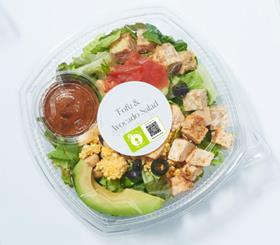
A UK food technology start-up has launched a food impact database that allows businesses to easily calculate, reduce, and label the environmental impact of their food.
Foodsteps is the first UK-based tech firm to provide carbon tracking and impact labelling to restaurants and caterers as well as food businesses.
Founded by Cambridge University alumni Anya Doherty, the firm was created in response to the challenges facing food businesses looking to improve their sustainability and reach net zero. She developed the labels following the world’s largest study into carbon labelling conducted by Cambridge University, which she co-led, that tested labels on 85,000 consumers.
Historically, food companies have lacked access to a standard database where they can easily find out the environmental impact of their recipes and ingredients. This was one reason why Tesco’s ambition to introduce carbon labelling across the food sector failed in 2012.
In response, Foodsteps has developed the first British-specific impact database for food, covering over 1,000 ingredients and incorporating carbon footprint, pollution, water use, and land use impacts.
Developed alongside world-leading scientists and academics at Cambridge University, Foodsteps’ database provides the breakthrough knowledge that could allow for widespread carbon labelling adoption across the industry should it be made mandatory by the UK Government.
Providing the technology for food businesses to reach net-zero
With the database at its core, Foodsteps promises to bring a new era of technology to the food industry, disrupting how businesses evaluate and communicate sustainability to customers. In addition to carbon labelling, the company offers three technology solutions to help businesses become leaders in sustainability – a cloud-based platform, labelling capability, and QR code scanning.
On the platform, food providers can upload recipes and view the sustainability impact of each ingredient. The platform can be used to monitor targets, develop new recipes, and improve a menu or product’s sustainability.
Doherty said:“Restaurants, caterers, and food providers are increasingly looking for ways to review, improve, and demonstrate their action on sustainability. Foodsteps allows them to do that, by giving them access to the latest technology and data, without the commitment and fees associated with traditional carbon assessments,' Doherty said.
'With our platform, consumer tools, and carbon labelling capabilities, brands can differentiate themselves in the market and communicate with customers in ways they never have before.
'It is my belief that if we can make assessing and communicating environmental information in the food industry more accessible and standardised, there is no reason why it won’t become as widespread as nutritional information.”
From there, companies can choose to print their own labels to clearly communicate the environmental impact of a product. These labels provide a traffic light rating from A-E (A meaning low environmental impact, E meaning high environmental impact) and have been deemed the most effective in influencing consumer decision making.
Food companies can also make use of Foodsteps’ virtual education tools, with each label containing a QR code that buyers can scan to learn more about the products’ impact and what the company is doing on sustainability.



